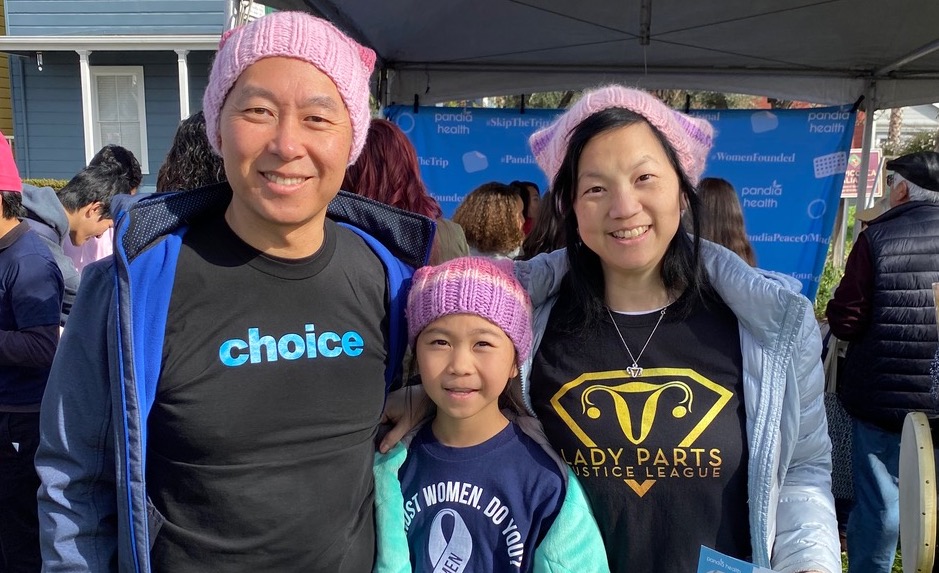
When Sophia Yen was growing up in California during the 1970s, abortion was not discussed in her house. Neither was pregnancy or reproductive health in general.
Now a doctor specializing in adolescent medicine and the founder of Pandia Health, a startup that provides customers with easy access to birth control, the 50-year-old mom has made sure her two daughters, Sabrina, 15, and Stephanie, 12, are comfortable talking about what was once taboo.
Yen and her youngest daughter recently watched The Janes, an HBO documentary that highlights The Jane Collective, an underground network that helped women seek illegal abortions — a terrifying reality that, five decades later, seems relevant again as the Supreme Court is poised to reverse Roe v. Wade.
In light of the looming decision that will affect the lives of millions — 58% of U.S. women of reproductive age live in states that are “hostile” to abortion, according to The Guttmacher Institute — The Story Exchange spoke with Yen and Stephanie about why it’s important to keep fighting for the right to a safe abortion.
Editor’s note: This Q&A has been edited and condensed for clarity.
Stephanie, you just watched The Janes on HBO. What did you think?
Stephanie: It was pretty eye-opening. [Abortion] was always just told on the news or briefly explained over dinner. Watching the documentary, just to see it from all these different perspectives of how women experienced abortions and how they were able to help other people — it was very exciting and inspiring.
Sophia, you were born in ’71. Stephanie, you were born in 2009. Sophia, growing up, was your family open about pregnancy and abortion?
Sophia: I would say as an Asian-American family, it was, ‘don’t ask, don’t tell.’ Just take care of your business and don’t get pregnant until you’re married. I had met my boyfriend when I was 14, and then I was sexually active at 15. Being pre-med, I was like, ‘I cannot get pregnant in college. I cannot get pregnant in med school, residency, fellowship.’
Did you know people personally who had abortions?
Sophia: I was a Planned Parenthood pregnancy test results counselor. As a high school student, I volunteered there and ran the pregnancy tests. When they turned positive, I would be the one to give them the results. Certainly, I saw people choose termination.
Stephanie, how much does your mom share about her work? How comfortable are you talking about this topic?
Stephanie: Well, my mom would explain her work pretty frequently, mostly in the car while we’re going to restaurants. Some of it, I thought I knew what it was about, [but] then I didn’t until I grew up more. I was like, ‘Oh, I thought it meant this.’
Sophia: We were talking about abortion, reproductive rights, terminating pregnancies. The key is that she’s been around birth control. She even pitched [potential clients for Pandia Health].
Stephanie: Sometimes at summer camps, my mom would be like, ‘Your counselors are the perfect age to pitch.’ I would carry a business card with me and have a little notepad with a little birth control speech and I would be like, ‘Hi, do you need birth control?’
Basically doing your mom’s marketing for her?
Sophia: [Laughs] I recruited her. She’s my first sales rep.
Stephanie, you came into this world with all of these rights that women had fought for years ago. How does it feel to possibly go backwards?
Stephanie: Since I just watched The Janes, I know what it was like to live back in the day, and it was pretty scary watching the entire thing. Then you can see what the consequences really were. I don’t think I would ever want to go back to a world like that.
Sophia: It’s very concerning, because the United States is not just going back 50 years, it’s going back 100 years, because it took 50 years to get that right — and now we’ve lost it.
On a local level, what can people do?
Sophia: I do think that we need to take to the streets when they reverse Roe v. Wade to show that we are angry and that this is unacceptable. We need to educate our [male] allies. Just like with gun control, young people may not be able to vote, but they certainly can sway the opinion of their parents and grandparents. I care more about the next generation than myself. I’ve made it clear to my daughters that they are not allowed to attend any college where abortion is illegal, because, God forbid, there’s a 1 in 4 chance of being sexually assaulted if you are a college student.
It’s really hard to raise a child right now and it’s really hard to be a kid right now. There’s just so much going on. How are you guys managing?
Stephanie: Well, with Covid, school was pretty tough. It was weird because I made friends mostly online. It just seems like we’re living in a broken world. My sister told me that she doesn’t want to have kids because she feels like she would be birthing them into a dying world, which is just depressing to me.
Sophia: It’s like, ‘What have we done to these children and the hope of the future?’ I think we can fix things, and back to what can people do — vote, get people activated to vote and march. My children have marched in every pro-choice march that has existed and I’ve been lucky to be onstage a few times.
Stephanie, any idea what you’re interested in doing for a career? Would you want to follow your mom’s footsteps or do something totally different?
Stephanie: When I was younger, I always wanted to be a doctor like Mom, because I wanted to help people. But then she said it takes an extra four years of school…
Sophia: Being a doctor is absolutely rewarding. You can help people, you can save lives. But it is a long, hard haul. It’s summer, so we’re going to explore what she wants to do. But I’m like, ‘Learn a new language, do some cooking, do something fun. Watch a TEDx talk.’
The article has been updated to clarify parts of the conversation.




